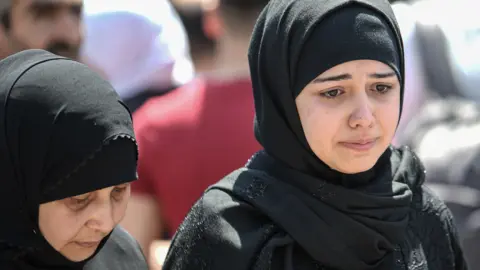Syria war: Turkey warns Europe of new migrant wave
 AFP
AFPTurkey has warned it may reopen the route for Syrian refugees to enter Europe if it does not get more international support for creating a safe zone in northern Syria.
President Recep Tayyip Erdogan called for "logistical support" to establish a safe zone in Syria's north-east.
"Either this happens, or we will be forced to open the gates," he said.
Turkey is hosting more than 3.6 million Syrians who have fled the civil war. The US backs the "safe zone" plan.
But the plan is controversial, because Syrian Kurdish forces are wary of Turkey moving many Syrians into the north-east who are not originally from that area.
The ethnic Kurdish People's Protection Units (YPG), seen by Turkey as a terrorist group, do not want to make way for Turkish forces in that area.
The US military has backed the YPG against so-called Islamic State (IS) fighters, whose territory is now much diminished.
"Our goal is for at least one million of our Syrian brothers to return to the safe zone we will form along our 450km [280-mile] border," Mr Erdogan said in a speech in Ankara.
"Give us logistical support and we can go and build housing at 30km depth in northern Syria."
Exodus from Idlib
Turkey wants US forces to jointly patrol the safe zone, and Mr Erdogan said Turkey was "determined to set it up by the last week of September".
Turkish officials also fear that heavy fighting in the north-western province of Idlib could push more refugees into Turkey.
Syrian government forces backed by Russian aircraft are pounding rebel and jihadist forces in Idlib. Turkey backs some of the rebel groups there.
Tens of thousands of civilians have already fled north from Idlib to the Turkish border.
Under a 2016 agreement with the EU, Turkey imposed stronger controls to curb the flow of migrants and refugees to Europe.
The deal involved an EU pledge to provide €6bn (£5.4bn; $6.6bn) in aid to Turkey to house Syrian refugees.
Mr Erdogan complained that only €3bn of that had arrived so far, though earlier Natasha Bertaud, an EU Commission spokesperson, said €5.6bn had been provided.

Pressure on Greece again
The 2016 EU-Turkey deal helped to ease the crisis on Greek islands near Turkey, whose facilities were overwhelmed by a refugee influx in 2015.
However, the situation remains very tense in Moria, a packed migrant camp on the island of Lesbos. Young migrants clashed with Greek police there on Wednesday.
The aid group Médecins Sans Frontières (MSF) says some 24,000 people seeking protection in Europe are now "trapped on the Greek islands in horrendous conditions".
MSF says the sea arrivals on the islands have reached levels not seen since 2016. More than 100 children in MSF's clinic on Lesbos have complex or chronic conditions, it says.
